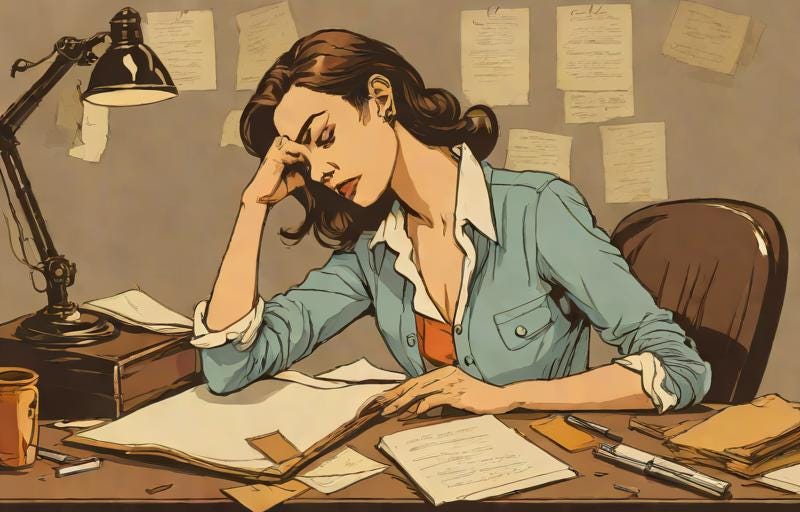Changing news writing styles, BOOKY podcast update & how books are wowing Hollywood
Plus, author Brian Groom's publication event, International Booker Prizes longlist, journalism apprenticeships, SOE conference & problems of AI books on Amazon
My dear wordsmiths,
It is a truth universally acknowledged, that a Substack author in in possession of a newsletter, must be in want of followers. Please, if not already ..
Now that’s out the way I can report no countryside updates from the shire as the lambs remain unborn and the pheasants still appear to be with us - I did see one squashed one on the road but hopefully not one of ours.
In other news though, the long promised BOOKY podcast series is in the bag - all nine episodes recorded and about to be launched. I can’t tell you how long this has taken to get all the ducks in a row. You can listen to the promo HERE - see if you can guess which authors are featured. I’ll share very soon. Here’s a little taste of the artwork.
Also to update, my advertised ‘in conversation’ with Speaker of the house Sir Lindsay Hoyle at Chorley Lit Fest has been cancelled to no-one’s surprise, so I’ll shut up about that. It all went so well last year as well.. can’t think what’s changed.
My favourite thing this week is this article in Variety. It turns out all those fancy Hollywood executives left the Oscars and boarded the plane to the London Book Fair to find new projects. It’s hardly news that books adaptations are a thing but with the success of recent films and the voracious appetite of Netflix et al. we may all get our novels optioned yet even if we do still have I’m Just Ken ringing in our ears.
‘Books are not only a proof of concept but, in the case of bestsellers, they come with a built-in audience.’ Variety
Anyway, I was staring at the first sentence of my (novel) manuscript today. I could have said pondering, or musing, but I was staring at with it with a large dollop of the insecurity reserved solely for novelists and journalists. Of course, opening lines (intros) for the two professions are not one and the same. Both journalists and novelists must grab attention and provide that curiosity gap which entices the reader to keep going and both must be enigmatic but that is where the similarity ends.
Journalism
These days journalists largely write online and headlines/intros have changed. Unless you are working for, say an untraditional news model on a subscription-based newsletter here on Substack or for a broadsheet publication whose in-depth nature is the selling point, the headline and first line is written to optimise for search engines (SEO) rather than painting a feature-style compelling picture with words and for a reason.
Key words, trending phrases and critical search terms are included rather than descriptive language and flowing prose. Of course, journalists get a lot of criticism for this and pinned with the lazy trope of ‘click bait’ - but journalism is a business - and there's no point baking a cake if no-one will eat it.
Headlines and intros online serve the same purpose as headlines and billboards back in the day (and indeed novel titles and cover design for books) - they bring in customers. But online they have to please the tricky ever-changing algorithms as well or nobody will be served the articles via search or in their social feeds. News businesses need to make the money to survive, unless they are a charity, privately funded, or the BBC. And if you think YOU are choosing what turns up in your Facebook feed, or via programmatic advertising on a website, I can assure you it’s the algorithm - they are the boss for many.
True story: I once had to talk to a (very lovely) complaining website reader about why he was being served loads of care home adverts on his laptop. I explained the searches he had made dictated the subject matter (it turned out to be his son who had done the searching.. oops)
As a journalist of two decades I can confirm all this has thrown the traditional pyramid style of news-writing into somewhat disarray - not including the key points of the article so readers stay engaged no longer works if you need to get bums on seats. You must also provoke and engage to improve your ranking - sound familiar?
Another factor for journalists is attention span as we can see from the analytics it is rare indeed for an individual to read a long article to the end or even past the first few pars. These days we all have depressingly short focus for news and information of this type as we doom scroll through our days.
We are the Twitter and Tik Tok generations and largely, we process information at speed, and in palatable forms like bullet points, explainers and of course via video. The sad reality for many news organisations is that long quality reads do not get the attention they deserve - and don’t always pay the bills.
It’s hard to hear, I know. I became a journalist to be a writer and I love a feature interview or an informed opinion but now I’m at the business end of journalism reality, I know our change in process is for a reason if not a palatable one. But we can see the realities of what people read, watch, and engage with in cold hard data. Of course there is still a place for quality long-form journalism but it still needs to be sold, albeit via newsletter or documentary or dare I say it, newspapers. There is a great deal of innovation underway across the sector from large and small news providers - change is constant - and there will always be room for a bloody good writer and journalist. I’d love to hear your thoughts.
Novel writing
So where does this leave novelists? In regard to the actual writing of the book the first line remains critical to sell it to an agent or a publisher, to sell to a prospective reader scanning page one. It must be intriguing without being obvious. The most compelling opening lines become ICONIC after all, including:
‘It was a pleasure to burn’
Fahrenheit 451 by Ray Bradbury
and
‘In a hole in the ground there lives a hobbit’
The Hobbit by JRR Tolkien
and not forgetting..
‘It was a bright, cold, day in April and the clocks were striking thirteen’
Nineteen eighty-four by George Orwell
News, events & opportunities for writers and journalists:
Made in Manchester publication day event:
Write Reject Repeat alumna Brian Groom’s new book Made in Manchester: A people’s history of the city that shaped the modern world is out on May 23. Tickets are now on sale for event at Waterstones, Deansgate, on Thursday May 23 at 6.30pm. READ HIS Q&A HEREThe International Booker Prizes longlist:
There are 13 titles on the Booker prizes longlist, featuring the best in translated fiction, published in the English language in the UK and Ireland. The titles are:
Not a River by Selva Almada, translated by Annie McDermott
Simpatía by Rodrigo Blanco Calderon, translated by Noel Hernández González and Daniel Hahn
Kairos by Jenny Erpenbeck, translated by Michael Hofmann
The Details by Ia Genberg, translated by Kira Josefsson
White Nights by Urszula Honek, translated by Kate Webster
Mater 2-10 by Hwang Sok-yong, translated by Sora Kim-Russell and Youngjae Josephine Bae
A Dictator Calls by Ismail Kadare, translated by John Hodgson
The Silver Bone by Andrey Kurkov, translated by Boris Dralyuk
What I’d Rather Not Think About by Jente Posthuma, translated by Sarah Timmer Harvey
Lost on Me by Veronica Raimo, translated by Leah Janeczko
The House on Via Gemito by Domenico Starnone, translated by Oonagh Stransky
Crooked Plow by Itamar Vieira Junior, translated by Johnny Lorenz
Undiscovered by Gabriela Wiener, translated by Julia SanchesAI scams:
They are becoming a real problem on Amazon, says NPRJournalism apprenticeships:
Our friends at Journo Resources have compiled a full list of journalism apprenticeships HERESociety of editors conference 2024: The Society of Editors 25th anniversary Conference 2024 will take place at the Leonardo Royal Hotel, London, St Paul’s on 30 April 2024. The future of AI and journalism, re-setting police and media relations and engaging new audiences in politics will be key focuses. High profile speakers for the conference will include the Lady Chief Justice the Baroness Carr of Walton-on-the-Hill; Jonathan Munro, Deputy CEO of BBC News and more.
Until next week, Nicola x




